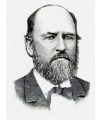This information is based on newspaper accounts and other public information and is presented as accurately as possible. Before you copy and paste this information to your website, please keep in mind that this research took a lot of effort. Appreciate it. Learn from it. But do not plagiarize it. Yes, if you think we might be talking to you, we are.
H

Robert West Humphreys
President
Biography
Robert W. Humphreys (1824-1878), a Montgomery County native, was a prominent lawyer in Clarksville, Tennessee.
I
John P. Ilsley
Superintendent
Biography
In early March 1860, the railroad’s board elected J.P. Ilsley as the road’s new superintendent.
“From all we learn of this gentleman, the Board has made a wise selection. As a reliable business man, we presume (he) has but few superiors. From his long connection with railroad affairs, he will doubtless prove a great acquisition to the Company.”
B. S. Ivy
Foundry Foreman
Biography
B.S. Ivy joined the Western and Atlantic Railroad circa 1873.
J
M. A. Jackson
Conductor
Biography
M.A. Jackson resigned his post as conductor on the Edgefield and Kentucky Railroad in about October 1868.
